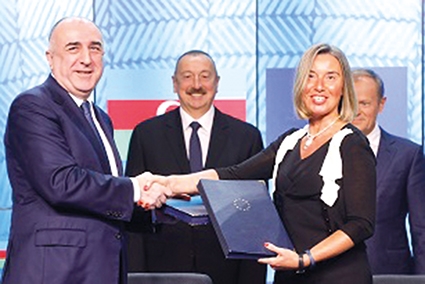EU – Azerbaijan Partnership Priorities Reinforce Bilateral Agenda
On 11 July, EU High Representative Federica Mogherini and the Minister of Foreign Affairs of Azerbaijan, Elmar Mammadyarov, completed negotiations of the EU-Azerbaijan Partnership Priorities in the presence of President of the European Council, Donald Tusk, and the President of Azerbaijan, Ilham Aliyev.
The process of developing the Partnership Priorities began in November 2016, when the Council of Europe adopted a mandate for the European Commission and the High Representative for Foreign Affairs and Security Policy to negotiate a comprehensive agreement with the Republic of Azerbaijan. The new agreement is designed to replace the previous Partnership and Cooperation Agreement, more deeply considering the shared objectives and modern challenges of the EU and Azerbaijan. Negotiations on the new agreement were launched in February 2017 following President Aliyev’s visit to Brussels. The Partnership Priorities is laid out along the lines of the 2015 review of the European Neighborhood Policy and provides a fresh platform for healthy, productive political dialogue and cooperation between the EU and Azerbaijan.
EU Neighbors reports that the Partnership Priorities “represent an important step forward in EU-Azerbaijan relations and will guide and enhance this partnership over the coming years.” The newly signed partnership focuses on four main areas – strengthening institutions and good governance; economic development and market opportunities; connectivity, energy efficiency, environment and climate action; and mobility and people-to-people contacts – “while also staying true to the principle of differentiation in the EU's relationships with the Eastern Neighborhood countries,” says EU Neighbors.
The European Commission press release breaks down the agreement, saying that: good governance includes the fight against corruption, public administration reform, and crime and terror-defense capacity building; economic development includes the sustainable diversification of the economy, support for WTO membership, and improving business and investment environments; climate action includes building on the successful cooperation on energy connectivity and significant progress made on the Southern Gas Corridor, including support for Azerbaijan's ability to operate as a trade, logistics and transport hub, regulatory assistance, and sustainable resource management; mobility includes support for education and human capital, and increasing opportunities for EU and Azerbaijani citizens to meet and exchange experiences.
The Partnership Priorities also provides a policy framework for planned financial cooperation between Azerbaijan and the European Union through 2020.
The EU press release says that “through these Partnership Priorities, the EU and Azerbaijan renew their commitment to an ambitious and comprehensive agenda. The agenda will reflect the values and principles of the European Neighborhood Policy, including respect for human rights, democracy, the rule of law, and dialogue with civil society.”
Ongoing negotiations for a new bilateral agreement coincide with the finalization of the Partnership Priorities deal, sending a clear signal that both the EU and Azerbaijani sides are interested in enhancing their relationship. Members of the EU and Azerbaijan leadership teams hope that the relationship will bring positive results to benefit the citizens of both places.
The Partnership Priorities now moves to be formally approved by both parties before being officially adopted but is expected to be supported by the EU and Azerbaijan.
The European Union has gradually expanded the scope of its cooperation with Azerbaijan since relations were established in 1991. Azerbaijan has been included in the European Neighborhood Policy (ENP) since 2004, and in the Eastern Partnership Initiative since its founding in 2009. A Protocol on Azerbaijan's participation in EU Programs and Agencies was adopted in July 2016.
By Samantha Guthrie












